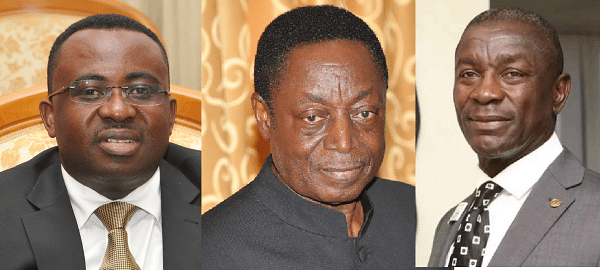
Give trial documents to Duffuor, others - Court orders A-G
The Accra High Court has ordered the Attorney-General's Department (A-G) to serve former Finance Minister, Dr Kwabena Duffuor and 11 others who are standing trial over the collapse of unibank and UT Bank, with all the documents it intends to rely on for the trial.
Justice Philip Bright Mensah , a Justice of the Court of Appeal sitting as a High Court judge, gave the A-G up to June 15, to file the disclosures.
The order by the court Thursday (May 21, 2020) is in line with a Supreme Court decision that made disclosures a must in all criminal trials, reports Graphic Online's Emmanuel Ebo Hawkson.
Hearing of the trial will continue on June 18
Collapse of uniBank
Dr Duffuor, Dr Johnson Pandit Asiama and six others have been charged with 68 counts for the collapse of uniBank.
The A-G has accused Dr Duffuor, who was a shareholder of uniBank, of contributing to the collapse of the bank by “dishonestly receiving” GH₵663.28 million from the bank.
It is also the case of the A-G that even though uniBank was in financial distress, Dr Asiama allegedly used his position as the Second Deputy Governor of the BoG to approve the transfer of GH¢300 million, which was an unsecured credit facility from uniBank to the Universal Merchant Bank (UMB).
Dr Duffuor, who is also a former Governor of the BoG, has been charged with dishonestly receiving and money laundering, while Dr Asiama has been charged with wilfully causing financial loss to the state and contravention of the Bank of Ghana Act, 2002 (Act 612).
The six other accused persons in the collapse of uniBank are Dr Kwabena Duffuor II, a son of Dr Duffuor, who was the Chief Executive Officer (CEO) of uniBank; Ekow Nyarko Dadzie-Dennis, the Chief Operating Officer of the bank; Elsie Dansoa Kyereh, the Executive Head of Corporate Banking; Jeffery Amon, a Senior Relationship Manager; Kwadwo Opoku Okoh, the Financial Control Manager, and Benjamin Ofori, the Executive Head of Credit Risk at the bank.
They have been charged with various counts of fraudulent breach of trust, money laundering and conspiracy to commit crime.
All the accused persons have pleaded not guilty to the charges.
UT Bank case
With regard to the collapse of UT Bank, Dr Asiama, Prince Kofi Amoabeng, the Founder of UT Bank; Raymond Amanfu, a former Head of the Banking Supervision Department (BSD) of the BoG, and two others — Catherine Johnson, Head of Treasury, and Robert Kwesi Armah, the General Manager of Corporate Banking, both of UT Bank — had been charged.
UT Holdings, the parent company of UT Bank, which is said to be controlled by Amoabeng, was also charged over the collapse of the bank.
It is the case of the A-G that Amoabeng “dishonestly appropriated “more than GH¢100 million of depositors’ funds that were invested in the defunct UT Bank.
The A-G has accused Dr Asiama and Amanfu of also acting unlawfully and causing financial loss to the state.
The two have been charged with wilfully causing financial loss to the state for allegedly approving GH¢460 million in liquidity support, “without following prescribed mandatory conditions”.
“No payment was made for liquid support by the BoG,” the A-G stated in the facts accompanying the charge sheet.
The accused persons in that case have also pleaded not guilty to all the charges.
Revocation of licenses
UniBank and UT Bank were part of the seven indigenous banks whose licenses were revoked by the BoG in 2017 and 2018 after the central bank declared them insolvent.
The other banks were the BEIGE Bank, the Royal Bank, the Sovereign Bank, the Construction Bank and the Capital Bank.
The BoG allowed the state-owned bank, GCB Bank, to assume the reins of UT Bank and Capital Bank, after taking over their assets, in order to protect depositors’ funds.
The BoG merged the other five banks into one entity, known as the Consolidated Bank Ghana (CBG).
Writer’s email:
